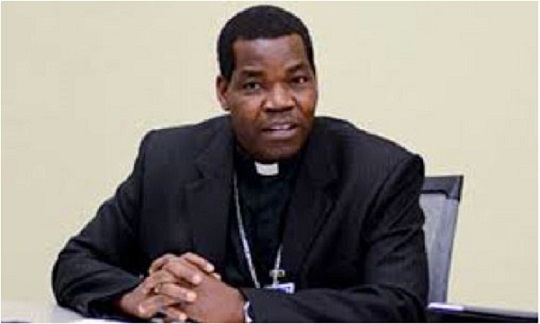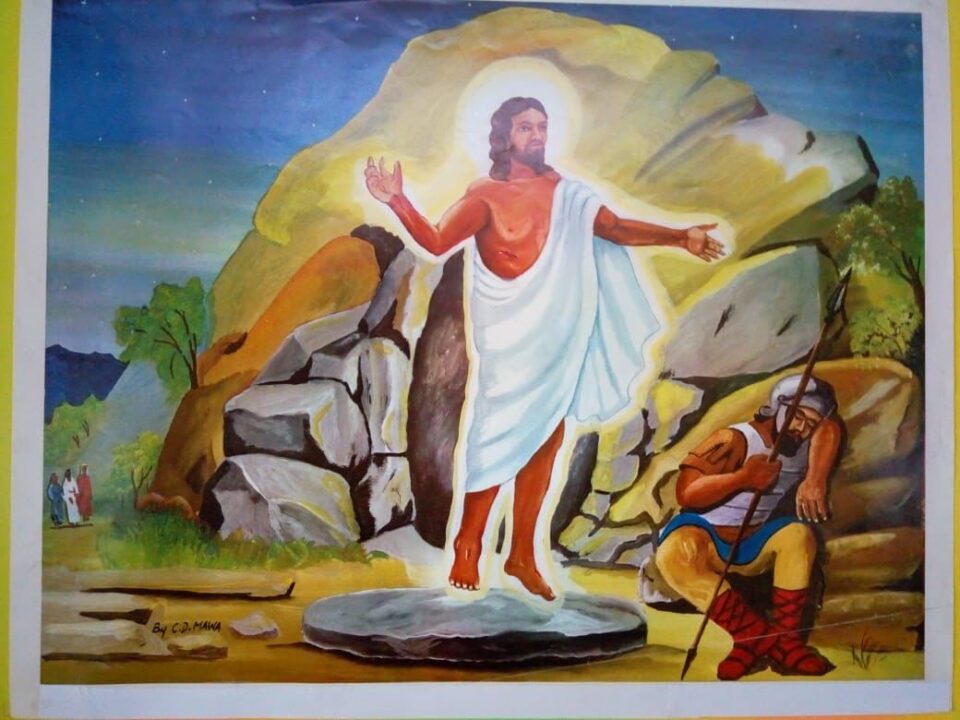- Contact us on - Contactez-nous sur - Contacte-nos em
- +233-30-277-8867/8
- +233-30-277-2548
- secam@secam.org
New Head of Church in Sudan and South Sudan Prioritizes Restructuring of Bishops’ Conference: Interview Part 1
New Head of Church in Sudan and South Sudan Prioritizes Restructuring of Bishops’ Conference: Interview Part 1
CANAA || By Father Don Bosco Onyalla, Nairobi || 16 January 2017
 The President of Sudan Catholic Bishops’ Conference (SCBC), Bishop Barani Eduardo Hiiboro Kusala of the Catholic diocese of Tombura-Yambio in South Sudan, is in Nairobi consulting about the functioning of a national Bishops’ conference in view of restructuring his conference.
The President of Sudan Catholic Bishops’ Conference (SCBC), Bishop Barani Eduardo Hiiboro Kusala of the Catholic diocese of Tombura-Yambio in South Sudan, is in Nairobi consulting about the functioning of a national Bishops’ conference in view of restructuring his conference.
In an interview with CANAA on Monday, January 16, the Bishop has described the nature of SCBC, which brings together two independent countries of Sudan and South Sudan. He has also spoken about the immediate plans in his new leadership role as well as the challenges he hopes to overcome to realize these plans. He went on to respond to questions about the current situation of conflict in his country of South Sudan, including the efforts the Church is making in working toward lasting peace.
At the beginning of the interview, Bishop Eduardo said he prefers to be called Barani and explained, “Barani is a word in my language, which indicates “our father” and I think that is a respectful word for responsibility.”
Below is the full text of the first part of the interview, which focuses on Bishop Barani’s plans to restructure SCBC. The second part of the interview will be published on Thursday, January 19, 2017.
CANAA: You have accepted a new role in the Church of South Sudan. Kindly speak about this new responsibility that is upon you.
Bishop Barani: Last October 2016 in our last Plenary meeting in Khartoum, the Bishops (of Sudan and South Sudan) decided to elect me as the President of the Bishops’ conference, which I accepted for sure because it seems I had no option. Despite the fact that I had told them that my diocese is big and that I have so many things to do, the Bishops said “No” and that for this time they would like me to help and, in a way, to revitalize the conference.
CANAA: Thank you for accepting this new responsibility and congratulations. Briefly describe this conference, which brings together the Church in Sudan and the Church in South Sudan.
Bishop Barani: (The) structure of the conference is one. We have one Episcopal Conference of Sudan and South Sudan. We are all one and we felt that it was necessary to keep one Conference simply because we have been together and that in Sudan there are only two dioceses and with two bishops – actually at the moment, we have one Archbishop, one Auxiliary Bishop, and the Cardinal (who is) the Archbishop Emeritus of Khartoum. We couldn’t leave them in that situation, so we decided to be together.
And even in South Sudan, many of the dioceses are without Bishops, except Apostolic Administrators. We have nearly four dioceses out of seven without Bishops. That is one of the contributing factors that we have to keep the conference one, to build ourselves, to feel together, and we can lay proper foundation for whatever might happen in the future.
It is also a unique conference. We have two Apostolic Nuncios, two Papal legates for this one single conference of two countries. We have a Nuncio for Sudan, and we have a Nuncio for South Sudan, but we all collaborate without any problem; it is almost like the trinity where there is no conflict.
CANAA: Having accepted this new responsibility as the president of Sudan Catholic Bishops’ Conference (SCBC), what are some of your immediate plans going forward?
Bishop Barani: First of all, my choice as the President of the Bishops’ conference is a new beginning, a historical shift. The “Sudanization” of the Church in Sudan by then that happened in 1975 was made by the Bishops who have led this country until now that it is separated into two, this one Church until this moment, the founding fathers of the conference. And at this moment, majority of whom have retired, and some have gone back to God, and very few are left. In fact, I have picked up the role from Cardinal Zubeir who was one of the founding fathers; he is the only one still active, and actually now he has retired.
Now, this is a new generation. But with old problems. My immediate role: number one of course is that I need to inform myself about this institution, the Bishops’ conference. I need to love it; I need to accept it; I need to cherish it so that I can be able to offer my best for it.
Number two, this is of course institution of God. It is not mine. Definitely we would need to pull spiritual strengths from God to see that we can run this institution very well. In order to do that, we definitely need a lot of prayer in order to handle the old situations that have been within the conference.
The third thing, which I need to do which is actually number one in terms of work, is to set up the structure. With the division of the country into two, with the ongoing conflict, our conference has been like almost stagnant. The first thing is to see that the (conference) structure is viable, and is able to be effective and efficient. And to do this, that means that we need to create a possible, humble, first-thing-first, of an office: The Secretary General and a few departments that might be required for now, so that we are able to put the policies, the system, and the culture of work within this first moment. From this, I think we will lay down our first plan only for 2017 and see what we can do now until the end of 2017. It is only after that we can evaluate and be able to lay a plan for two years or three years to come.
CANAA: Considering the critical need for the structures within the Bishops’ conference, which you have just described, how do you hope to achieve this goal of structures within the conference?
Bishop Barani: Actually, my main reason of being in Nairobi at this time is first of all to seek the wisdom, the guidance, the expertise of the Kenya Conference of Catholic Bishops (KCCB). I have come to seek their knowledge, their expertise. In fact, this morning I met the Secretary General, Father Daniel (Rono) whom I have found to be so good, so open, and I really fell in love with him in terms of his love for the Church. I have invited him to come over to South Sudan next week where we are going to have an initial meeting, a brainstorming meeting on how to start this whole thing all over again.
It is not easy; it is not so simple; it is not a quick fix. It is going to take us some time. But during that meeting, we may put our fingers on a few important things that we must begin with. So, as I speak about structure, it means the whole thing to get the conference back on its feet surely it will need personnel. We already have the Secretary General, but we need people around him, then the (financial) resources, and space to allow this first beginning to unfold.
CANAA: With all these plans of structuring the conference to be operational in an efficient and effective manner, what challenges do you think you will need to surmount to realize these plans?
Bishop Barani: The first challenge is to understand how the conference is supposed to work. I have to educate myself about this. One of it also is to bring together the personnel who are supposed to work with the standing committee that we have; to be able to create the spirit of teamwork, so that we together, hand in hand hold this work at the very initial stage in the right direction. It is still challenging because we are wherever we are, and I am trying now to see how we can come together.
The second challenge is of course that Juba is where the Secretariat is (yet) some of the resources and facilities for the conference are in Sudan and we need to bring some of the things down or get new ones. So for sure we will also have financial difficulties. For all these years we have not been raising money or having resources at our disposal where we can be able to begin the work quickly.
The other thing is the trained personnel, people who know what to do, who will help us to get this dream realized. So, we will also embark on how to get the right people in the right place.
The other thing is also the political challenges. It is not easy to move. Most the (Local) Ordinaries are their dioceses. To get them over to Juba is not easy; communication is a challenge. Roads are not passable in many places. You can only (travel) by air, and these (planes) are not always there, they are not reliable. So, insecurity is a huge challenge for us to pick up quickly this responsibility.
In the second part of this interview, Bishop Barani speaks about the current situation of conflict in his country of South Sudan, the efforts the Church is making, and concludes with his personal message to the citizens of Africa. Look out for this interview on Thursday, January 19.

